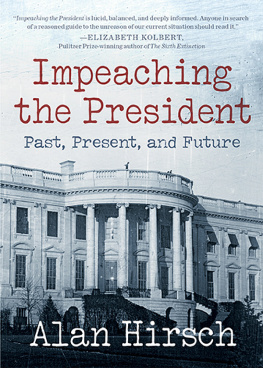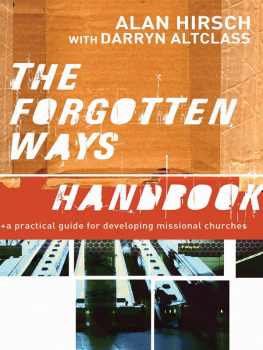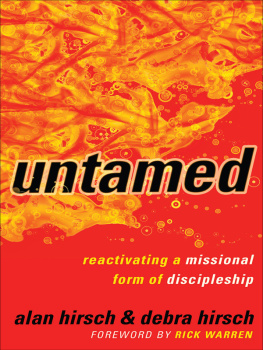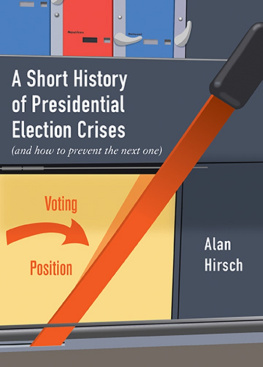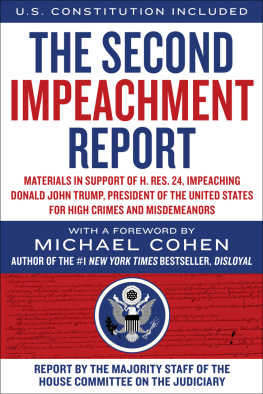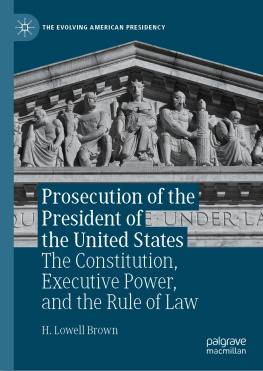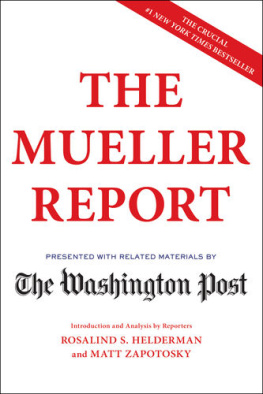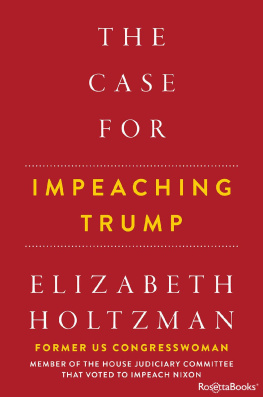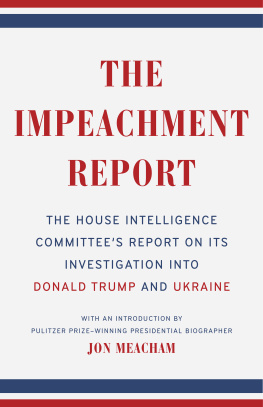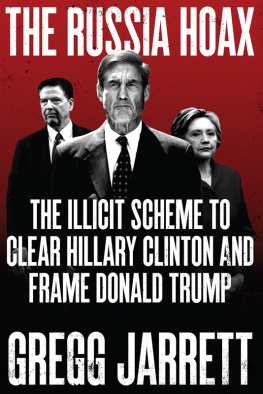ADVANCE PRAISE FOR
IMPEACHING THE PRESIDENT
Hirschs lucid prose and careful analysis make the book a fine corrective to cavalier popular rhetoric surrounding discussions of impeachment.
Publishers Weekly
Impeaching the President is lucid, balanced, and deeply informed. Anyone in search of a reasoned guide to the unreason of our current situation should read it.
Elizabeth Kolbert, Pulitzer Prizewinning author of The Sixth Extinction: An Unnatural History
In an era when the notion of impeachment is tossed around as the ultimate political indictment, Alan Hirsch guides us with a steady hand through our own history to consider the three presidents who faced that ultimate punishment. This is a sober, precise, and carefully argued analysis that should be read by every member of Congressand every president.
David K. Shipler, former reporter for the New York Times and Pulitzer Prize recipient
Alan Hirsch brings clarity, wisdom, and wit to a contentious and critical subject. Impeaching the President is must reading for all concerned citizens.
Howard Shapiro, former FBI General Counsel
Incredibly readable, well-researched, analytically sound and important.
Alan B. Morrison, Associate Dean for Public Interest & Public Service at the George Washington Law School
PRAISE FOR
FOR THE PEOPLE: WHAT THE CONSTITUTION REALLY SAYS ABOUT YOUR RIGHTS
(CO-AUTHORED WITH AKHIL AMAR)
A fascinating conversation over the future of our Constitution and our Bill of Rights.
Legal Times
Consistent and contentious throughout, Amar and Hirsch offer an analysis that should threaten both liberals and conservatives with a commitment to popular sovereignty both like to avoid.
Kirkus
A healthy challenge to conventional wisdom, with significant implications for public policy.
Booklist
Amar and Hirsch believe in the people... and they devote the most valuable part of their book to some useful reassurance against some of the boogeymen with which populism is often discredited.
New York Times
Impeaching the President
Past, Present, and Future
Alan Hirsch

Copyright 2018 by Alan Hirsch
All Rights Reserved.
The Open Media Series is edited by Greg Ruggiero.
Special thanks to John Richard and Essential Information.
Cover image: One of the earliest known photographs of the White House, by John Plumbe, Jr., 1846.
Library of Congress Cataloging-in-Publication Data
Names: Hirsch, Alan, 1959- author.
Title: Impeaching the president : past, present, and future / Alan Hirsch.
Description: San Francisco : City Lights Books, [2018] | Includes bibliographical references.
Identifiers: LCCN 2018026391 (print) | LCCN 2018035420 (ebook) | ISBN 9780872867635 | ISBN 9780872867628
Subjects: LCSH: ImpeachmentsUnited States. | ImpeachmentsUnited
StatesHistory. | PresidentsUnited States. | Johnson, Andrew,
1808-1875Impeachment. | Nixon, Richard M. (Richard Milhous),
1913-1994Impeachment. | Clinton, Bill, 1946Impeachment. |
Trump, Donald, 1946Impeachment.
Classification: LCC KF5075 (ebook) | LCC KF5075 .H57 2018 (print) | DDC 342.73/068dc23
LC record available at https://lccn.loc.gov/2018026391
City Lights Books are published at the City Lights Bookstore
261 Columbus Avenue, San Francisco, CA 94133
www.citylights.com
INTRODUCTION
The idea of impeaching the 45th president surfaced during the 2016 presidential election before we even knew who that president was going to be. Opponents of Hillary Clinton made no bones about their desire to push impeachment should she win, based on her use of a private e-mail server when she was secretary of state. Similarly, opponents of Donald Trump maintained that his extensive personal business holdings disqualified him from faithfully serving in the public interest as mandated by the presidential oath of office. Calls for Trumps impeachment on this and other bases began almost before he had completed his inaugural address. His impeachment became a more realistic prospect a few months later with the appointment of special counsel to investigate possible criminal activities perpetrated by the Trump campaign.
Throughout 2017, as Special Counsel Robert Mueller indicted several high-ranking officials in the Trump campaign and transition, commentators warned that the nation was headed for constitutional crisis. Debates broke out that went to the heart of U.S. democracy. What would happen if President Trump pardoned all those indicted? What if Trump attempted to pardon himself? What if he fired the special counsel before the latter completed his investigation? What was to be made of the claim by President Trumps personal attorney, John Dowd, that the president cannot obstruct justice because he is the chief law enforcement officer under [the Constitution]? Critics responded that Dowds view puts the president above the law and thus contradicts a fundamental premise of the U.S. Constitution. Who was right?
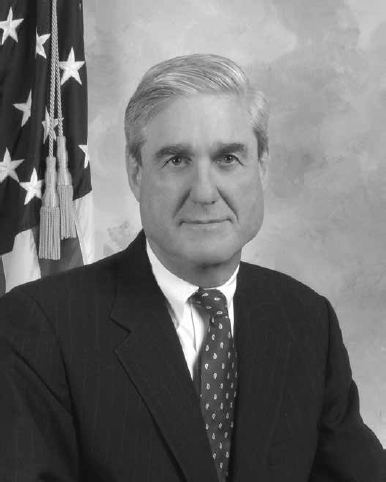
Special Counsel for the U.S. Department of Justice Robert S. Mueller III.
Such questions, once fodder for law school exams and scholarly musings, have immediate relevance for our republic today. Fortunately, in addressing these questions, we do not write on a blank slate. The philosopher George Santayana famously observed that those who cannot remember the past are condemned to repeat it. The more optimistic version is that, by learning from history, we can shape a better future. We must, therefore, revisit the scope, purpose, and history of presidential impeachment.
This book looks in depth at the impeachment sagas surrounding Andrew Johnson in 1868, Richard Nixon in 1974, and Bill Clinton in 1998, in order to draw lessons for future impeachments. We then apply those lessons to the circumstances surrounding Donald Trump, mindful that we face a constantly evolving situation. First, though, we need to place impeachment within a broader context.
The genius of the U.S. constitutional design lies largely in the numerous interlocking clauses that protect against the tyranny that can result when any person or group obtains too much power. Such protection starts with the division of government into two separate spheres of authority, federal and state, and the division of the former into three separate branches with specific responsibilities.
But the founders knew that even this careful division of power would not establish sufficient protection. Congress only makes laws, but what if it passes laws that suspend elections or instruct the courts how to decide cases? The president has executive power only, but what if he uses such power to harass or intimidate the other branches? The courts only decide cases, but what if they wantonly strike down Congresss laws and the presidents executive actions? Because limiting the authority of the three branches might not suffice, the founders also gave each branch means of keeping the others from overstepping.
The greatest risk of tyranny comes from the executive branch, in part because the president is a single person. Members of Congress and the Supreme Court cannot accomplish anything unless they persuade a majority of their colleagues to go along. In addition, the presidents authority includes command over law enforcement and the military. For these reasons, maintaining restraints on presidential power is crucial.

